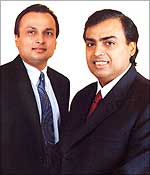 | « Back to article | Print this article |
Anil seeks probe into RIL's 'huge scandal'
 Questioning clearance by junior oil ministry officials to the near four-fold hike in costs to Rs 45,000 crore for gas fields by Mukesh Ambani-led RIL, Anil Ambani on Thursday demanded a probe into the 'huge scandal.'
Questioning clearance by junior oil ministry officials to the near four-fold hike in costs to Rs 45,000 crore for gas fields by Mukesh Ambani-led RIL, Anil Ambani on Thursday demanded a probe into the 'huge scandal.'
"I am deeply concerned that RIL's capital expenditure of nearly Rs 45,000 crore (Rs 450 billion) on KG-D6 fields as confirmed in Parliament by the petroleum minister and which is nearly 33 per cent of India's total defence budget was cleared by a management committee..." he told PTI in an e-mailed interview.
"The committee comprised of one junior level official each from the petroleum ministry and director general of Hydrocarbon and two representatives of the contractor (RIL). . . talk about conflict of interest," he said, adding that any expenditure above Rs 150 crore (Rs 1.5 billion) by any arm of government goes to the Cabinet Committee of Economic Affairs for approval.
Given the incredibly high stakes involved, the Comptroller and Auditor General and Central Vigilance Commission should examine relevant facts and find out if capex was overstated, Anil said, pointing that budgeted expenditure of RIL for peak production of 40 mmscmd was only Rs 12,000 crore (Rs 120 billion) in 2004.
Anil alleged that petroleum ministry, particularly after the changes in 2006 (when Murli Deora took over as minister), was colluding with RIL in its quest to make 'super-normal profits of Rs 50,000 crore (Rs 500 billion)' at the cost of power and fertiliser sectors.
Anil also raised questions over prohibitively high transportation cots for KG-D6 gas, while suggesting a probe by power and gas sector regulators like PNGRB, CERC and SERC.
He said that pipeline networks in the country were operating on a cost-plus basis, and therefore, end-users from power and fertiliser sectors were, in effect, paying for the networks too.
"To my mind, there is a strong case to revisit the issue of transportation costs for KG-D6 gas, probably the highest in the world, by the PNGRB, the pipeline regulator. Presently, these are pegged at a prohibitive $1.25, or 30 per cent of the base gas price!
"Further, with new tax breaks recently announced, the entire cost of setting up the gas pipeline network has been allowed to be written off in the very first year -- a special and unique benefit not given to any other capital intensive sector. It is only fair that the benefits of these tax breaks be passed on, and gas transportation costs be brought down to near zero."
He expressed the 'hope that the regulators in gas and power sectors such as PNGRB, CERC and SERC, would examine this aspect more carefully."
At RNRL's AGM earlier this week, Anil also pointed out that the gas transportation company was no longer owned by RIL and it had been sold to the promoters of RIL for a 'princely sum of Rs 500,000, and turned into a privately held company."
Asserting that a gas price of $4.2 was 'exorbitant' and unjustifiable, especially in the wake of as much as 80 per cent crash in the international prices over last few months, Anil said 'n its pursuit of corporate greed, RIL has even forgotten the vision of the founder chairman (Dhirubhai Ambani).'
Attacking the oil ministry also for its biased role in favour of RIL, he said: "This is a unique case in the history of independent India, where the actions of one arm of the government, i.e. the mnistry of ptroleum, are ostensibly harming the interests of another arm, ministry of power's jewel in the crown NTPC -- all for sake of a monopolistic gas producer, RIL."
He further said that the petroleum ministry's intervention in a corporate commercial dispute, if permitted to continue, would erode investor confidence and 'thwart the government's efforts to attract investments into India."
Image: Anil and Mukesh Ambani